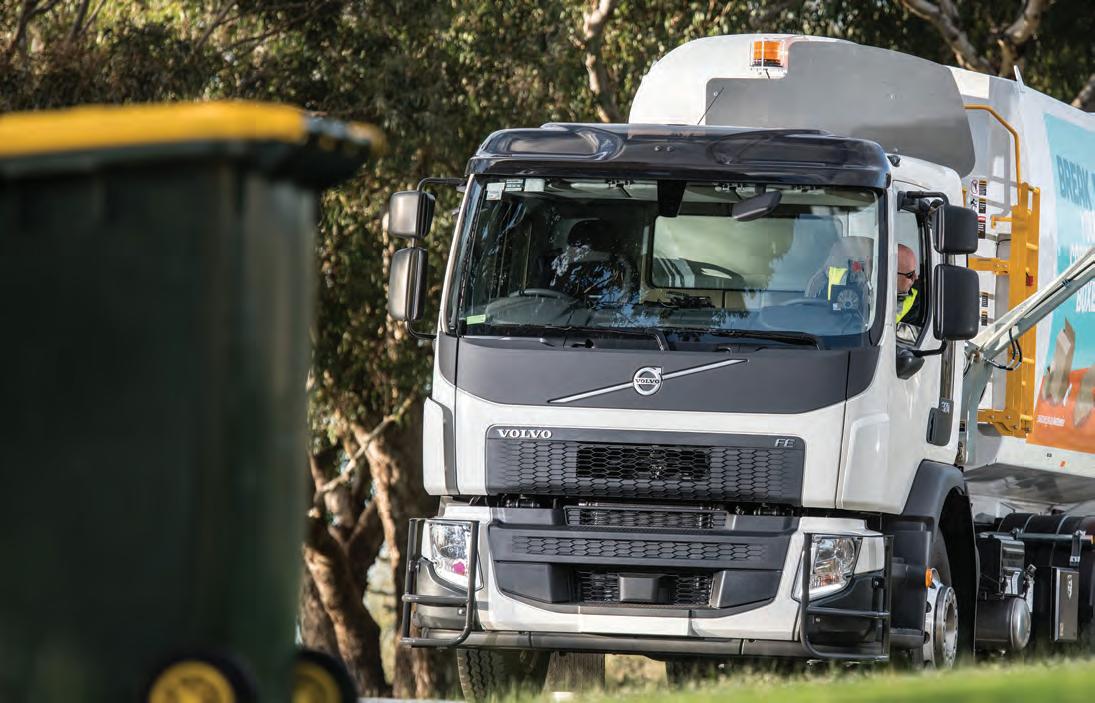
3 minute read
IS YOUR BIN HEALTHY?
THE CITY OF SWANS LATEST WASTE EDUCATION INITIATIVE, WHICH
INVOLVES AUDITING THE CONTAMINATION LEVELS OF HOUSEHOLD BINS, HAS LED TO A 53 PER CENT DECREASE IN RECYCLING BIN CONTAMINATION..
From kerbside collection to education and training, the City of Swan in Western Australia manages all its own waste services.
The city covers a large and diverse area across Perth’s eastern metropolitan region and has a population of 149,195.
Colin Pumphrey, Fleet and Waste Manager, says while some areas of the city are historically efficient in recycling, others with high density populations need further assistance.
Since April, the City of Swan has been conducting ‘health checks’ on residential kerbside bins to help the community improve recycling habits and reduce waste contamination.
“We need to understand what areas of the city needed our attention in terms of recycling education, and what areas are already doing well,” Colin says.
“We have worked closely with the Western Australian Local Government Association (WALGA), which had already developed a successful process for bin tagging.”
According to WALGA, similar programs in South Australia have reduced waste contamination by up to 60 per cent and increased the amount of recycling by 25 per cent.
Colin says bin auditing involves city staff visually checking the contents of general waste and recycling bins in randomly selected areas.
The checks are then followed by constructive individual feedback on how each household can waste less and recycle more.
“Feedback is first provided in the form of a tag on bin handles, which highlights if there are any contaminated items in the recycling
The City of Swan manages all its own waste services.

bin or items in the general waste bin that could be recycled,” Colin explains.
As a result of the program, Colin says contamination rates in some areas have reduced by 53 per cent.
“In some areas the contamination levels were very high, so it’s a good outcome so far,” he says.
According to Colin, the auditing program is consistent with the city’s wider approach to waste and recycling education.
“As we don’t contract any of our waste collections, we can interact closely with the community to ensure the bins are healthy and uncontaminated,” Colin says.
“It’s not only beneficial in the wider environmental sense, but also helps
Colin Pumphrey City Waste Manager
the city streamline our education processes.”
Colin says while in some areas the issue of waste separation and contamination is well understood, the real challenge is keeping residents up to date with ongoing changes to the waste and recycling industry.
“It’s important for residents to understand the city isn’t just imposing random changes for no good reason, we want them to understand specifically what changes have been made and why?” Colin says.
“As Swan has a fairly transient and changing population, we have to keep the education process going – it’s not something you can do once and forget about.”
Changes to the city’s collection services include future food and organics collection trials, a pre-booked year-round bulk and green waste collection and stricter enforcement of contamination regulations. Colin says changes are in line with the state’s requirements to increase domestic processing and end markets. So far, the City of Swan has audited 2000 properties. “We had a couple of households that resisted quite strongly, but the public response has been really positive,” Colin says.
“After people understand the logic behind the program, they don’t seem to have a problem.”
Colin says city officials tag bins based on their level of contamination: good, intermediate or bad.
“If a bin is tagged negatively, residents are given two weeks to remove the contamination, then if needed, another two weeks to improve,” Colin says.
“During that time, city officials will speak with specific residents about how they can lower their contamination levels, and if changes aren’t made, we tape up their bin.”
Colin says 30 bins have been tapped up by the city so far.
“If people don’t comply after their bin has been tapped, the last resort is for council to take the bin away,” Colin explains.
“We have removed six bins in total, with one given back after discussions with the residents.”
Colin says he is currently writing the program’s final report, which he will then put to council.





